< Reconstruction:Proto-Turkic
Reconstruction:Proto-Turkic/kepelek
Proto-Turkic
Etymology
From *kepeli (“butterfly”) + *-ak (“diminutive suffix”). The rounding in some of the descendants is due to the neighboring labial /p/. Some of the descendants also exhibit metathesis to *kelepek. Eren (1999) suggests that this word is an onomatopoeic in origin.
Clauson suggets a loanword, but does not give a source language, pointing that it is only present in Oghuz, Karluk and Kipchak branches.
Compared to Proto-Mongolic *kibe (“moth”) (Mongolian хив (xiv, “moth”)) and Japanese コオロギ (kōrogi, “cricket”) by Altaicists, although such comparisons are deemed as unscientific by the consensus.
Declension
Declension of *kepelek
| Singular 3) | |
|---|---|
| Nominative | *kepelek |
| Accusative | *kepelekni, *kepelekig 4), *kepeleknig 1) |
| Genitive | *kepelekniŋ |
| Dative | *kepelekke |
| Locative | *kepelekde |
| Ablative | *kepelekden |
| Allative | *kepelekgerü |
| Instrumental 2) | *kepelekin |
| Equative 2) | *kepelekče |
| Similative 2) | *kepelekleyü |
| Comitative 2) | *kepelekligü |
1) Possibly in Pre-Proto-Turkic.
2) The original instrumental, equative, similative & comitative cases have fallen into disuse in many modern Turkic languages.
3) Plurality is disputed in Proto-Turkic. See also the notes on the Proto-Turkic/Locative-ablative case and plurality page in Wikibooks.
4) Found in the Old Turkic era.
2) The original instrumental, equative, similative & comitative cases have fallen into disuse in many modern Turkic languages.
3) Plurality is disputed in Proto-Turkic. See also the notes on the Proto-Turkic/Locative-ablative case and plurality page in Wikibooks.
4) Found in the Old Turkic era.
Descendants
- Common Turkic: *kepeli, *kepelek, *kelepek
- Oghuz:
- Karluk
- Karakhanid: [script needed] (kepēlī)
- Uzbek: kapalak
- Uyghur: كېپىنەك (këpinek)
- Karakhanid: [script needed] (kepēlī)
- Kipchak:
References
- al-Kashgarî, Mahmud (1072–1074) Besim Atalay, transl., Divanü Lûgat-it-Türk Tercümesi [Translation of the “Compendium of the languages of the Turks”] (Türk Dil Kurumu Yayınları; 521) (in Turkish), 1985 edition, volume I, Ankara: Türk Tarih Kurmu Basımevi, published 1939–1943, page 448
- Clauson, Gerard (1972) “kepe:li:”, in An Etymological Dictionary of pre-thirteenth-century Turkish, Oxford: Clarendon Press, page 689
- Levitskaja, L. S., Dybo, A. V., Rassadin, V. I. (1997) Etimologičeskij slovarʹ tjurkskix jazykov [Etymological Dictionary of Turkic Languages] (in Russian), volume V, Moscow: Jazyki russkoj kulʹtury, page 29
- The template Template:R:tr:Eren does not use the parameter(s):
entry=kelebek
Please see Module:checkparams for help with this warning.Eren, Hasan (1999) “Proto-Turkic/kepelek”, in Türk Dilinin Etimolojik Sözlüğü [Etymological Dictionary of the Turkish Language] (in Turkish), Ankara: Bizim Büro Basım Evi, page 227 - Nişanyan, Sevan (2002–) “kelebek”, in Nişanyan Sözlük
- Räsänen, Martti (1969) Versuch eines etymologischen Wörterbuchs der Türksprachen (in German), Helsinki: Suomalais-ugrilainen seura, page 291
- Starostin, Sergei, Dybo, Anna, Mudrak, Oleg (2003) “*kepelek”, in Etymological dictionary of the Altaic languages (Handbuch der Orientalistik; VIII.8), Leiden, New York, Köln: E.J. Brill
- Tenišev E. R., editor (1984–2006), Sravnitelʹno-istoričeskaja grammatika tjurkskix jazykov: [Comparative Historical Grammar of Turkic Languages:] (in Russian), Moscow: Nauka, page 187
See also
| Animals in Turkic | |||||
|---|---|---|---|---|---|
 Dog |
dog: *ït |
 Hunting Dog |
hunting dog: *eker |
 Hen |
hen: *tiakïgu |
 Lark |
lark: *torgay |
 Pigeon |
dove, pigeon: *kȫkerčin |
 Quail |
quail: *bïldurčïn |
 Sparrow |
sparrow: *serče | .jpg.webp) Hawk |
hawk, falcon: *kïrguy |
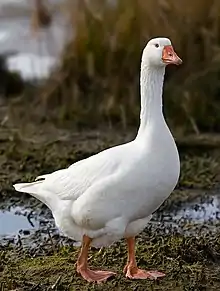 Goose |
goose: *kāŕ |
.jpg.webp) Wolf |
wolf: *bȫrü |
 Cow |
cow: *ingek |
 Calf |
calf: *buŕagu |
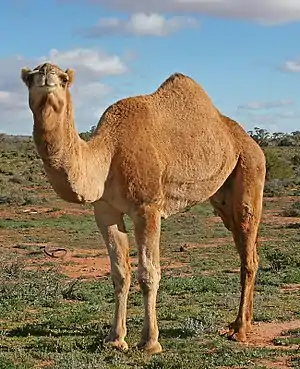 Camel |
camel: *tebe |
.jpg.webp) Young Camel |
young of camel: *kȫĺek, *botu |
 Horse |
horse: *at |
 Foal |
foal: *kulun |
.jpg.webp) Worm |
worm: *kūrt |
 Snake |
snake: *yï̄lan |
_(4).jpg.webp) Fox |
fox: *tilkü |  goat |
goat: *keči | 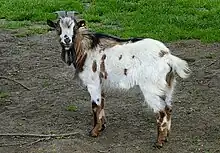 He-goat |
he-goat: *teke |
_male_6y.jpg.webp) Lion |
lion: *arsïlan |
 Fish |
fish: *bālïk | Abramis brama |
carp bream: *čapak |
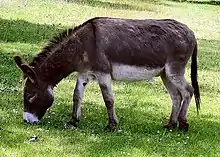 Donkey |
donkey: *eĺčgek |  Carp |
carp: *siāŕgan | 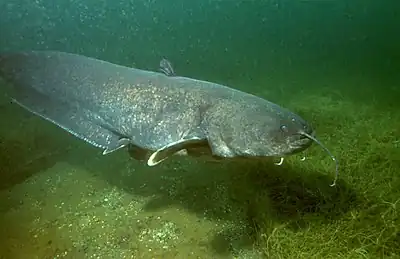 Catfish |
catfish: *yāyïn |
 Beaver |
beaver: *kunduŕ | 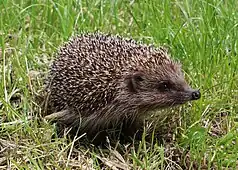 Hedgehog |
hedgehog: *kirpi |  Badger |
badger: *borsmuk |
 Fly |
fly, mosquito: *siŋek |  Bee |
wasp, bee: *ārï | .jpg.webp) Gadlfy |
gadfly: *bȫgen |
_2.jpg.webp) Moth |
moth: *küńe | 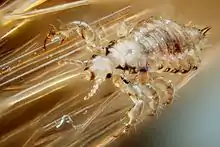 Louse |
louse: *bït | 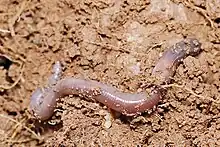 Earthworm |
earthworm: *sïbuĺgan |
 Yak |
yak: *kotuz | 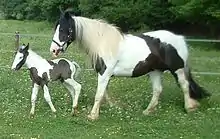 Colt |
colt: *sïp | 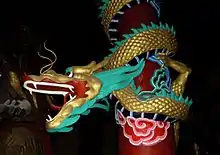 Dragon |
dragon: *siāŕgan |
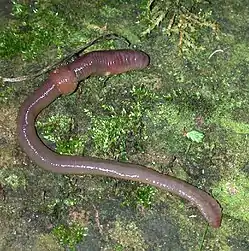 Worm |
worm: *kūrt | 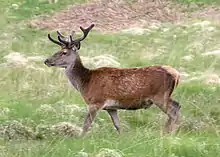 Deer |
deer: *keyik, *sïgun, *bulan, *bugu | 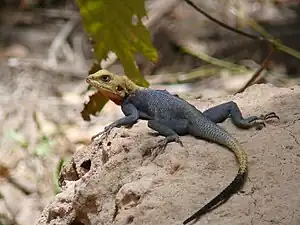 Lizard |
lizard: *keleŕ |
This article is issued from Wiktionary. The text is licensed under Creative Commons - Attribution - Sharealike. Additional terms may apply for the media files.